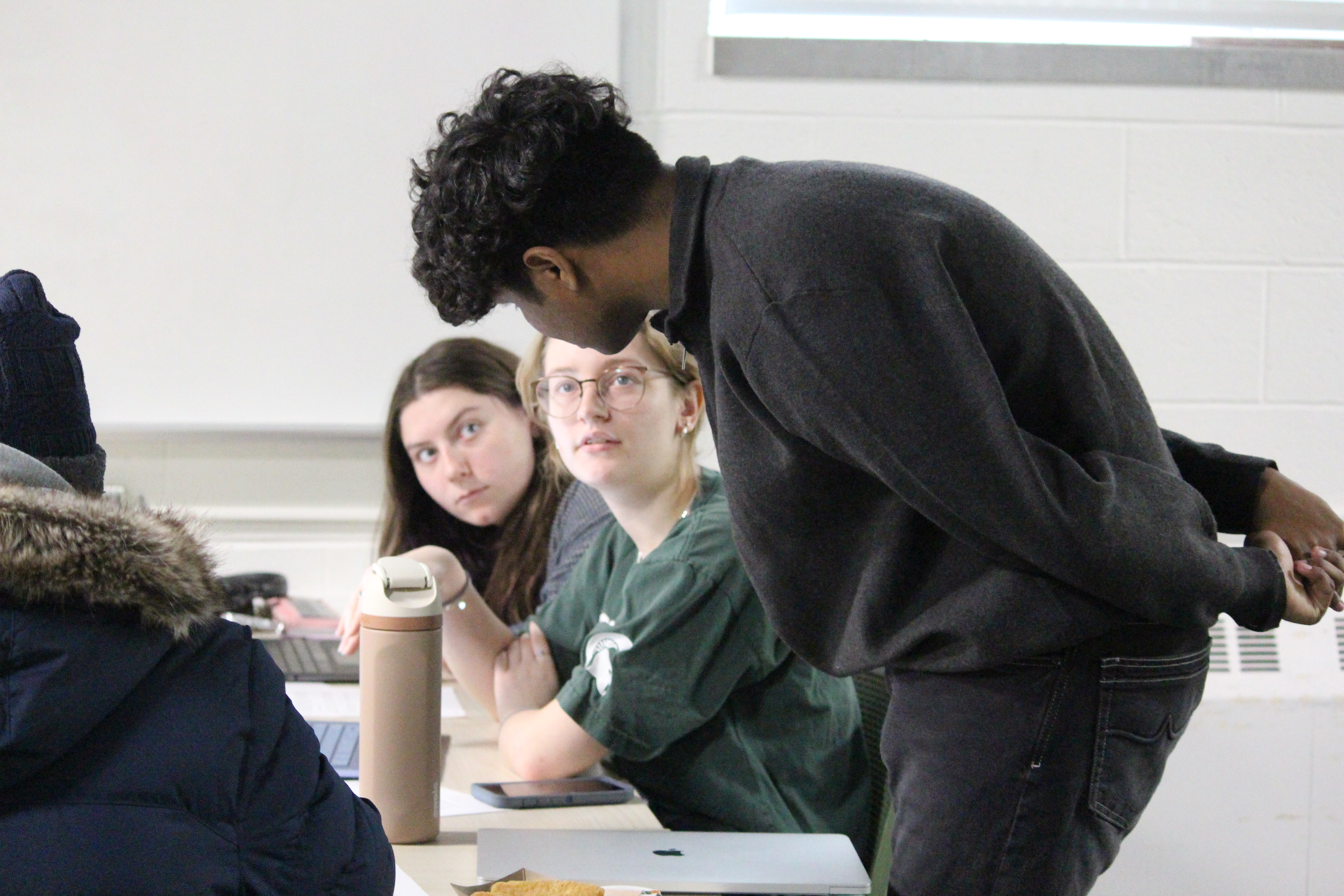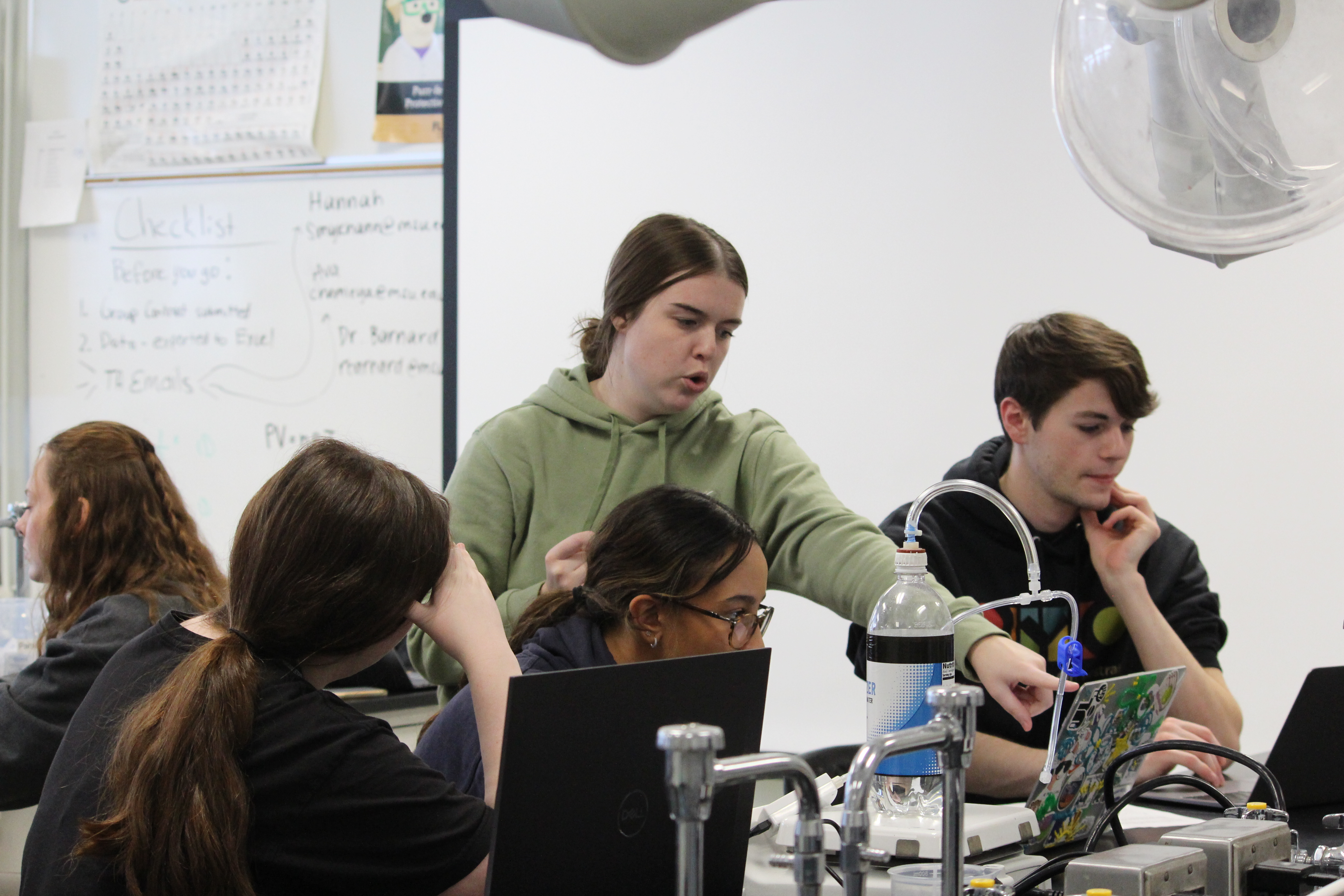Evidence-based, innovative teaching is a hallmark of the Lyman Briggs experience. In the residential college, Lyman Briggs students benefit from a living-learning environment, taking many of their classes with a cohort of peers who live in the same building where they take classes and labs, meet with their professors and advisors and eat in the cafeteria. This environment helps students build the community that supports their success.
Further, students learn from their peers within the classroom. In the majority of LB science and math courses, more advanced Briggs students serve as Undergraduate Learning Assistants, or ULAs, who, with the mentorship and supervision of faculty members, provide a supportive learning environment for Briggs students in lectures, labs, and recitations. Their exact responsibilities vary by course and professor, but they have a wide impact: In an average semester, over 120 ULAs support learning.
Going deeper: Helping students learn complex concepts
LB Undergraduate Learning Assistants help faculty by facilitating active learning during lectures, running lab experiments, leading recitations, as well as supporting group discussions and group work. They interact with students in the class and in office hours, helping students to understand concepts more fully, make connections across concepts and courses, and to succeed in classes. National research on undergraduate learning assistant programs has shown the outcome of such programs for learners: Students who take courses that are supported by learning assistants have shown better conceptual understanding, fewer low grades, and higher levels satisfaction with the course.
Going broader: Building equitable classrooms for all students
For Shahnaz Masani, assistant professor of LB biology, with a joint appointment in the MSU Department of Physiology, learning assistants don’t just help communicate subject material, they collaborate with her and can serve as change agents to help all students learn well. She writes, “ULAs have the power to transform the classroom at multiple levels. First, by bridging the power differential between professors and students as ‘near-peer educators’, but also by drawing on their experiences as a prior student in the class. Second, in my class, I explicitly ask ULAs to be advocates for students. So, their main role is to be observers of the students and how the students interact with the subject material and with one another. Their role is to point out to me things that I miss, so we can work together to shape a space where all my students not only learn but thrive.”
Some ULAs recently took part in a year-long fellowship called ACCESS intended to develop their equitable and justice-oriented teaching skills through professional development around structures and systems that affect learners.
Hannah Smyk, a fourth-year Briggs student majoring in human biology, who is a ULA for LB chemistry writes, “I have grown immensely as a leader throughout my time as a ULA. Whether it's explaining chemistry concepts, facilitating group discussion, or holding office hours, I've learned to lead through effective communication and empathy. This also entails fostering an environment where students feel comfortable and supported by noticing any racial disparities in the classroom and responding to them in a way that ensures maximum student success and collaboration.”
Another ACCESS participant reflected on how it enriched their perspective of each student’s humanity: “Respect your students and realize that every single person has an entire life they’ve lived through outside of your class and they aren’t just another body sitting in a chair.”
Going longer: Career impacts for ULAs
In addition to helping students learn, ULAs benefit by developing leadership and communication skills and confidence, gaining more mastery of the content they help teach, and increasing their likelihood of staying in college and achieving academic success. These benefits don’t stop upon a ULA’s graduation, however; they continue to have positive impacts throughout their lives.
LB alum David Cantor was one of the first-ever LB ULAs: He was a “Teaching Assistant” in 1969 with Steve Spees, a founding chemistry professor of Lyman Briggs. Spees and another founding professor in physics, Paul Parker, developed a novel chemistry-physics curriculum. As a ULA that inaugural year of the program, Cantor helped lead lab sessions and held office hours. In following years, Cantor helped to research, test, and write lab instructions for a broad range of lab experiments to extend and complement the new curriculum. Cantor earned bachelor’s degrees in chemistry and secondary education in 1973 and pursued a Ph.D. in analytical chemistry from the University of Illinois soon after.
He reflects, “When I think back on my career starting in Briggs, through graduate school, and then really my whole time working, the idea of being a teacher — formally or informally — was important to my success. I did a lot of mentoring. I did a lot of educating. And when I became a manager, then that's really a teaching role to a large degree. A lot of what I learned in those formative years at Briggs and in the MSU College of Education was involved in helping people learn things they didn’t already know. That was life-changing for me.”
Briggs alum Douglas Light graduated in 1976 with a degree in computer science and biology. During his years in Briggs, he served as ULA for a LB computer science course: APL (A Programming Language). He later became a computer programmer, then led sales in software companies and IT firms serving multinational businesses.
He talks about how being a ULA helped him in several ways: “It was rewarding because it made me a better student by reinforcing many of the things that I needed to know for my computer science studies. It also helped me socially."
Responding to students' questions during office hours helped him think about concepts differently, to better explain them to his peers.
"I was not very extroverted back then. I think being a ULA really helped me all through my career, feeling very comfortable working with groups of people or being in front of people," he says.
Going into the future: Shaping the future of science
The future of the Lyman Briggs ULA program is bright. Rachel Barnard, current director of LB ULAs, has a vision that, by 2035, the ULA Program at Lyman Briggs College will be a national leader in near-peer learning and inclusive education. Rooted in equity and driven by academic innovation, the program will advance interdisciplinary collaboration and leadership development, empowering ULAs and faculty to be transformative change agents in STEM education and beyond. She writes, “Through robust mentorship and training programs and a focus on transferable skills, the ULA program will prepare LBC graduates to drive progress across a range of fields, shaping the future of the sciences.”
The Lyman Briggs Learning Assistants Program is just one of many high-impact learning experiences in the college that transform lives through deeply engaging students, fostering deep learning, and empowering students for academic success.

